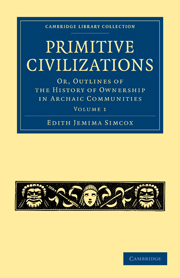Book contents
- Frontmatter
- PREFACE
- Contents
- CHAPTER 1 INTRODUCTION
- CHAPTER II PREHISTORIC PROBLEMS
- BOOK I OWNERSHIP IN EGYPT
- CHAPTER I THE MONARCHY AND THE ROYAL OFFICERS
- CHAPTER II THE ECONOMIC ORDER
- CHAPTER III COMMERCE AND INDUSTRY
- CHAPTER IV CASTE AND DESCENT
- CHAPTER V THE MILITARY CLASS
- CHAPTER VI THE NATIONAL RELIGION AND THE PRIESTHOOD
- CHAPTER VII CIVIL LAW AND CUSTOM
- CHAPTER VIII DOMESTIC RELATIONS AND FAMILY LAW
- BOOK II ANCIENT BABYLONIA
- BOOK III FROM MASSALIA TO MALABAR
CHAPTER V - THE MILITARY CLASS
Published online by Cambridge University Press: 07 September 2011
- Frontmatter
- PREFACE
- Contents
- CHAPTER 1 INTRODUCTION
- CHAPTER II PREHISTORIC PROBLEMS
- BOOK I OWNERSHIP IN EGYPT
- CHAPTER I THE MONARCHY AND THE ROYAL OFFICERS
- CHAPTER II THE ECONOMIC ORDER
- CHAPTER III COMMERCE AND INDUSTRY
- CHAPTER IV CASTE AND DESCENT
- CHAPTER V THE MILITARY CLASS
- CHAPTER VI THE NATIONAL RELIGION AND THE PRIESTHOOD
- CHAPTER VII CIVIL LAW AND CUSTOM
- CHAPTER VIII DOMESTIC RELATIONS AND FAMILY LAW
- BOOK II ANCIENT BABYLONIA
- BOOK III FROM MASSALIA TO MALABAR
Summary
The advocates of the existence of Caste in Egypt are also predisposed to believe that the priestly and military castes, as such, were the chief or only landed proprietors, in addition to the king himself; and the accounts given by Herodotus and Diodorus of the military administration of “Sesostris” are received with less than the usual scepticism of modern critics, because they seem to harmonise with this view, which is really only suggested by them. There is, however, nothing in the monuments of the first twenty dynasties to suggest, and very little to confirm, such an opinion; and though it has the support of so eminent an authority as M. Revillout, it did not originate with him, nor indeed with any professed Egyptologist; and therefore the degree of credit which it has obtained among such scholars is less convincing than it would be, if the theory had been based on the monuments and confirmed by the Greeks. If the Greeks are really the chief authorities for the ownership of land by the castes, their evidence can only be conclusive for their own times, and even then it will require to be interpreted by the light of what we know about the spirit of Egyptian civilization and institutions; which M. Revillout himself has so well shown to possess a kind of liberal humanity equally remote from mediæval feudalism or Brahminic sacerdotalism.
- Type
- Chapter
- Information
- Primitive CivilizationsOr, Outlines of the History of Ownership in Archaic Communities, pp. 129 - 143Publisher: Cambridge University PressPrint publication year: 2010First published in: 1894



